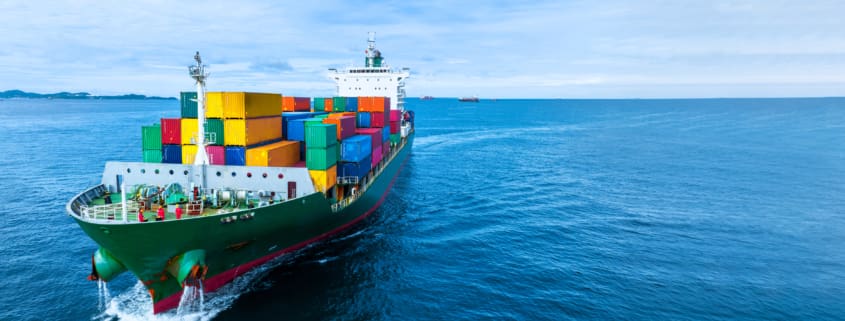What is Cargo Insurance and Why is it Important?
In the world of business, uncertainties are as much a part of the journey as successes. This truth holds especially when it comes to transporting goods – a crucial aspect of many industries. As your meticulously crafted products set forth on their global voyage, there’s a sea of challenges they could encounter. Storms, mishaps, and unexpected obstacles await, posing a potential risk to your investment.
This is where cargo insurance comes into play – a safety net that smart business owners rely on to navigate the unpredictable waters of goods transportation.
First, What is Cargo Insurance?
Cargo insurance helps to mitigate risks that accompany the journey of goods from origin to destination.
Marine cargo insurance stands out as the most prevalent approach to safeguarding the worth of your merchandise against physical harm, theft, or general average. It’s not a given that all shipped items automatically come with cargo insurance – this can widely differ depending on your location. Instead, individuals shipping or receiving goods have the flexibility to secure policies from specialized providers, major brokers, local agents, online platforms, or even freight forwarders.
Think of it like car insurance: You shell out for coverage to keep your car protected from the unpredictability of accidents and theft. It’s not always possible to predict or prevent such scenarios. Even if you sail through years without a hitch, you’re still ready to ensure your car’s safety. Because let’s face it, settling for the most basic coverage might put you in a tight spot financially if the unexpected does occur.
And here’s where the cargo insurance tale aligns perfectly. Opting to allocate a minor fraction of your goods’ value acts as a safety net against the twists and turns of life. By doing so, you’re prepping yourself for the day when the unforeseen eventually comes knocking.
What Is Covered by Cargo Insurance?
Cargo insurance can cover external causes of damage and loss to shipments. Common causes of damage or loss that may be covered by cargo insurance include:
- Piracy
- Acts of war
- Natural disasters
- Customs rejection
- Vehicle accidents
- Cargo abandonment
- and more
What Cargo Insurance Doesn’t Cover
Some scenarios and events that cargo insurance may not cover include:
Consequential Damages: Cargo insurance typically focuses on direct physical damage, loss, or theft of goods. It may not extend to cover indirect or consequential damages that result from these incidents. This could include financial losses due to missed deadlines or contractual obligations resulting from delayed deliveries.
Inherent Vice or Nature of Goods: Goods that are inherently susceptible to deterioration or wear and tear may not be fully covered by cargo insurance. Items like perishable goods or delicate items that are prone to damage due to their nature might not receive full compensation.
Improper Packaging or Handling: If goods are damaged due to inadequate packaging or mishandling during loading, unloading, or transportation, cargo insurance may not provide coverage. Proper care and precautions are essential to ensure coverage.
Unapproved Routes or Modes of Transport: Cargo insurance is often contingent on pre-approved routes and modes of transport. Deviating from these authorized routes or using unapproved methods of transportation could lead to coverage gaps.
War and Unrest: Acts of war, civil disturbances, and political unrest are typically excluded from cargo insurance coverage. These events are considered force majeure and may not be covered under standard policies.
Compliance and Legal Violations: Cargo insurance may not protect against losses resulting from non-compliance with legal regulations, customs requirements, or trade sanctions. Goods confiscated or rejected due to legal violations may not be covered.
Key Features of Cargo Insurance:
Comprehensive Coverage
Cargo insurance extends its embrace to a wide range of perils, including damage from accidents, theft, fire, and even natural disasters. This comprehensive coverage cushions the blow against unforeseen circumstances that could jeopardize your cargo.
Global Protection
Regardless of whether your goods are traversing oceans, skies, or lands, cargo insurance spans the entire spectrum of transportation modes. This global reach ensures that your shipments are shielded, no matter the terrain or distance.
Tailored Solutions
Cargo insurance isn’t a one-size-fits-all endeavor. Much like customizing a ship’s rigging to weather a particular storm, cargo insurance can be tailored to your unique needs, ensuring that your specific risks are addressed with precision.
Financial Safeguard
In the unfortunate event of loss or damage, cargo insurance serves as a financial safety net. This lifeline helps you recover the value of your goods, easing the burden of potential financial setbacks.
Common Risks: When Do You Need Cargo Insurance?
When it comes to moving goods from point A to point B, there are some common risks to keep an eye out for—damage, loss, and theft.
Damage: This covers situations where your goods might end up scratched, dented, or even wet during transit.
It’s the sender’s job to ensure that the items are packed securely. If the carrier receives a damaged or poorly packed shipment, they’ll note it down in the transportation documentation. For air or sea shipments, if the goods look battered when received by the recipient, the carrier takes direct responsibility. On the road, a note on the transportation documentation does the trick.
Lost or Stolen Goods: This refers to the disappearance or provable theft of all or part of the shipment. It’s crucial to establish that the loss or theft happened during transport. Usually, a note on the transportation documentation lists the contents and quantities of the shipment. The carrier acknowledges receipt by signing the documentation. If the recipient notices a loss upon delivery and documents it, this serves as proof that the loss occurred during transit.
Delays: Late delivery of goods can sometimes result in financial losses known as “consequential damages” or “special damages.” Carriers and freight forwarders rarely take responsibility for these types of damages. At most, they might need to refund the paid freight costs if they’re proven to be at fault. Insuring against consequential damages is typically challenging, as quantifying such losses and assessing associated risks can be tricky.
Any Questions?
At Apex, we want you to know and understand your options. We prioritize transparency and provide custom solutions to meet your insurance needs. Learn which policies are best for your business here.
Review our commercial insurance policies here.




